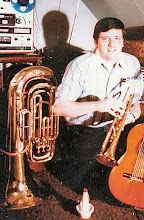

Side One
1. The Jazz Me Blues
2. Stranger On The Shore
3. Little Girl
4. When Your Lover Has Gone
Side Two
1. Struttin' With Some Barbeque
2. Georgia On My Mind
3. Diane
4. Margie
5. Indiana
Line Notes:
Personnel:
Pete Fountain - Clarinet
Eddie Miller - Tenor Sax
Jack Delaney - Trombone
Jim Duggan - Trombone
Mike Serpas - Trumpet
Earl Vuiovich - Piano
Oliver Felix - Bass
Charlie Lodice - Drums
Recorded At Studio In The Country, Bogalusa, Louisiana.
Produced By Pete Fountain And Bill Evans.
Engineered By Bill Evans.
Note: Same as LP 1977 First American Records FA-7706 Alive In New Orleans ond CD 1998 - Alive in New Orleans Laserlight 17 181 Delta Music Records
PETE FOUNTAIN
The clarinet is a musical magic wand all black and silver, sleek and elegant, emitting a round sound that has pleased the ears from the time of Egyptians to Mozart to modern New Orleans style music. The New Orleans clarinet style has been an influence in jazz and popular music since the earliest days of marching bands and jazz groups. George Gershwin recognized the spellbinding power of the clarinet when he gave it the opening lines of "Rhapsody in Blue," one of America's finest pieces of music. The clarinet is two instruments in one. The lower register, known as the chalumeau, yields the warm, deep tone, whereas the upper register emits the shrilling, high notes that are very exciting and very "Dixie" in jazz.
Pete Fountain hails from the heart of Dixieland, New Orleans. He was born in the French Quarter in 1930 and it was there that he learned to play the music he loves. He learned to play the clarinet from his father who could play almost any musical instrument by ear, especially the fiddle. As unlikely as it may sound, Pete had serious lung problems when he was young and he also had a keen interest in music by the age of nine. Because of his many medical bills it wasn't possible for his father to purchase a musical instrument for him until the day a doctor prescribed that a musical instrument be bought and that Pete be made to play so that his lungs would become strong. That was a happy day for Pete Fountain. After a few lessons in school and hours of listening to the records of Benny Goodman he was on his way to becoming a jazz musician and a great improvisor, even though his teachers didn't appreciate his improvisations.
In 1950 he formed "The Basin Street Six," a strictly Dixie jazz band. Unfortunately, Dixie was not popular in 1950, dance music was, so the band had to concede to play a little dance music to keep their job. As fate would have it, a representative from a television station heard the show and wanted the band to play Dixie, as he thought it should be revived and telecast live from the restaurant. It caught on and band's success convinced Fountain that he could make a living from his music.
The biggest break in his career came after a particularly fallow period in 1956 when Lawrence Welk called and asked him to make a guest appearance on the biggest musical show in television history. This invitation changed the course of Fountain's life. After a few years of being a Hollywood television star, his homesickness for New Orleans overwhelmed him and he quit the Lawrence Welk show to return to the heartland of his music and the source of his inspiration.
Back in New Orleans he founded a hot spot called French Quarter Inn in the Spring of 196o where people gathered, with reservations booked far in advance, to hear Pete Fountain's band really cook. So crank up the Victrola and take a walk down Bourbon Street to the tunes of Pete Fountain!
- REBECCA CELEBREZZE



1 comment:
pete"s one of the best swingin" net players with that great sound he has..of all time
Post a Comment